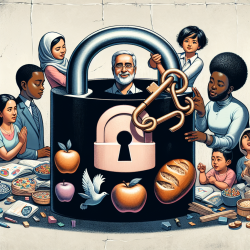Introduction
In today's world, the intersection of power imbalances, food insecurity, and children's rights is a critical issue that requires urgent attention. The research article "Power Imbalances, Food Insecurity, and Children’s Rights in Canada" by Alison Blay-Palmer provides an in-depth analysis of these challenges and offers insights into how practitioners can improve their skills to address these issues effectively.
Understanding the Research
The research highlights the significant impact of neoliberal market principles on food security and children's rights in Canada. Despite international commitments, such as the United Nations Convention on the Rights of the Child, Canadian children continue to face high rates of food insecurity. The article uses Gaventa’s “power cube” to explore the power dynamics that contribute to this situation, emphasizing the need for a shift towards more inclusive, rights-based policies.
Implementing Research Outcomes
Practitioners can enhance their skills by focusing on the following strategies derived from the research:
- Advocacy for Rights-Based Policies: Encourage the adoption of policies that prioritize children's rights over market forces. This includes advocating for national strategies that ensure food security as a fundamental right.
- Community Engagement: Engage with community organizations to empower marginalized groups and support initiatives that improve access to healthy food for children.
- Education and Awareness: Educate stakeholders about the importance of children's rights and the impact of food insecurity. Raising awareness can lead to increased support for policies that address these issues.
Encouraging Further Research
While the research provides valuable insights, it also highlights the need for further exploration into effective interventions. Practitioners are encouraged to conduct additional research on:
- The role of civil society organizations in shifting power dynamics to support children's rights.
- Innovative solutions for integrating food security into national policy frameworks.
- Effective methods for measuring the impact of rights-based approaches on children's well-being.
Conclusion
By understanding and implementing the outcomes of this research, practitioners can play a crucial role in addressing power imbalances and food insecurity. This will not only improve the lives of Canadian children but also set a precedent for other countries facing similar challenges.
To read the original research paper, please follow this link: Power Imbalances, Food Insecurity, and Children’s Rights in Canada.










